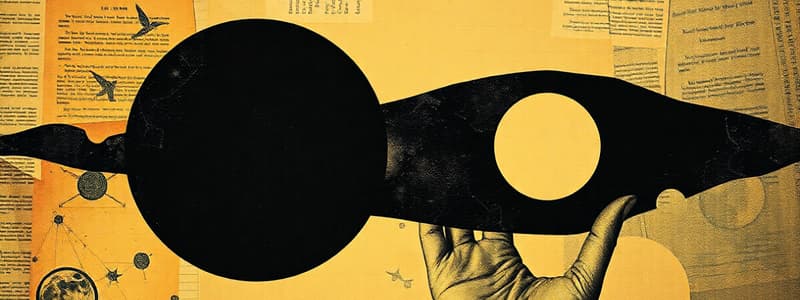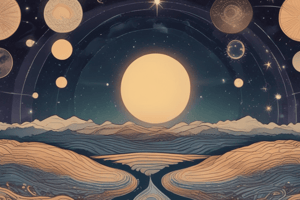Podcast
Questions and Answers
What type of object is necessary for the formation of a shadow?
What type of object is necessary for the formation of a shadow?
- Translucent
- Opaque (correct)
- Transparent
- Luminous
A solar eclipse occurs when the Earth passes between the Sun and the Moon.
A solar eclipse occurs when the Earth passes between the Sun and the Moon.
False (B)
What causes the shadow of an object to appear dark?
What causes the shadow of an object to appear dark?
The blocking of light
Light travels in straight lines called ______.
Light travels in straight lines called ______.
Match the type of eclipse with the correct alignment of celestial bodies:
Match the type of eclipse with the correct alignment of celestial bodies:
During a solar eclipse, what part of the Earth experiences a total solar eclipse?
During a solar eclipse, what part of the Earth experiences a total solar eclipse?
It is safe to look directly at the Sun during a solar eclipse without eye protection.
It is safe to look directly at the Sun during a solar eclipse without eye protection.
What term describes an object that does not allow light to pass through?
What term describes an object that does not allow light to pass through?
A ______ solar eclipse occurs when the Moon only partially blocks the Sun's light.
A ______ solar eclipse occurs when the Moon only partially blocks the Sun's light.
Match each eclipse type with its description.
Match each eclipse type with its description.
Why don't solar and lunar eclipses happen every month?
Why don't solar and lunar eclipses happen every month?
The Earth is an opaque object.
The Earth is an opaque object.
What is the name of the eclipse that occurs when the Earth blocks the sun's light from reaching the moon?
What is the name of the eclipse that occurs when the Earth blocks the sun's light from reaching the moon?
The Moon takes approximately ______ days to orbit the Earth.
The Moon takes approximately ______ days to orbit the Earth.
Match the location on Earth with the correct eclipse observation
Match the location on Earth with the correct eclipse observation
If you are in the dark part of Earth's shadow, what kind of eclipse do you see?
If you are in the dark part of Earth's shadow, what kind of eclipse do you see?
The orbit of the Moon is exactly in the same plane as the orbit of the Earth around the Sun.
The orbit of the Moon is exactly in the same plane as the orbit of the Earth around the Sun.
What is the correct order of the Sun, Earth, and Moon for a lunar eclipse?
What is the correct order of the Sun, Earth, and Moon for a lunar eclipse?
The shadow of the Moon forms on the ______ during a solar eclipse.
The shadow of the Moon forms on the ______ during a solar eclipse.
Match the term to its definition
Match the term to its definition
Flashcards
What is a solar eclipse?
What is a solar eclipse?
When the Moon comes between the Sun and the Earth, blocking sunlight.
What is a total solar eclipse?
What is a total solar eclipse?
An eclipse where the Moon completely blocks the Sun's light, visible from the center of the Moon's shadow.
What is a partial solar eclipse?
What is a partial solar eclipse?
An eclipse where the Moon partially blocks the Sun's light, visible from outside the center of the Moon's shadow.
What is a lunar eclipse?
What is a lunar eclipse?
Signup and view all the flashcards
What is an opaque object?
What is an opaque object?
Signup and view all the flashcards
What are rays of light?
What are rays of light?
Signup and view all the flashcards
When do eclipses occur?
When do eclipses occur?
Signup and view all the flashcards
Study Notes
Solar Eclipse
- A solar eclipse occurs when the Moon is positioned between the Sun and the Earth.
- The Moon, being made of rock, functions as an opaque object that obstructs light rays from the Sun.
- The Moon's shadow is cast onto the Earth during a solar eclipse.
- Observers within the central part of the Moon's shadow experience a total solar eclipse, where all direct sunlight is blocked.
- In areas outside the central shadow, a partial solar eclipse is visible where some light from the Sun still reaches the Earth.
Lunar Eclipse
- A lunar eclipse happens when the Earth is positioned between the Sun and the Moon.
- The Earth is an opaque object that blocks light from the Sun.
- The shadow of the Earth is cast on the moon.
- Solar and lunar eclipses do not occur every month because the Moon's orbit is slightly tilted relative to the Earth's orbit around the Sun.
- Eclipses can only occur when the Sun, Earth, and Moon align in a straight line.
- The Moon takes 27 days to orbit Earth
Shadows Explained
- An opaque object does not allow light to pass through it.
- Light travels in straight lines called rays.
- Shadows form when opaque objects block light from a light source.
- The area around a shadow appears brighter because it receives direct sunlight.
- When a shadow passes over a specific point, it appears darker, and it becomes brighter again once the shadow has passed.
- Never look directly at the Sun, even during an eclipse because it can cause permanent damage to your eyes.
Studying That Suits You
Use AI to generate personalized quizzes and flashcards to suit your learning preferences.




